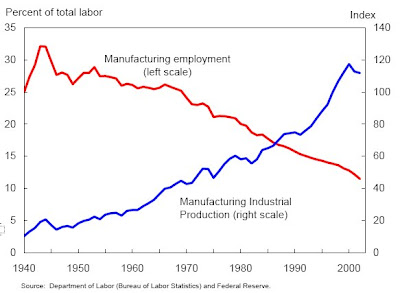Late Late Capitalism
May 6th, 2007 | Published in Data, Political Economy, Social Science, Socialism, Work
We live at a time when advances in technology make possible an easing of the burden of work by a reduction in working hours, and a tremendous expansion of human freedom. A moribund capitalism prevents us from realizing this potential, by turning productivity into profit instead of free time, and by trapping the creative potential of human knowledge in the form of private monopolies enforced by the state. Two pieces of data illustrate this point.
The first is this graph, which comes from a report of the President's Council of Economic Advisors (PDF):

Forget what you heard about outsourcing. The manufacturing sector in the U.S. produces eleven times as much as it did in the 1940's, but employs a far lower percentage of the population than it once did. All that increased productivity could be turned into reduced hours for all; instead it is turned into profits for a few, unemployment and uncertainty for many.
The second datum comes from a remarkable study that was reported today. An analyst at a private firm looked at American companies in order to determine where their value came from:
Cardoza said his research showed that tangible assets, like plants, equipment and inventory, represented four-fifths of the market value of U.S. companies 30 years ago. The other fifth came from intangible assets like brand name, reputation and other factors. Now, he said, the ratio has flipped, and intangibles, which he valued by subtracting tangible assets from a company's total market value, make up four-fifths of the pie, with the largest slice made up of patents, copyrighted material and other forms of intellectual property.
In other words, state-granted monopolies over knowledge, rather than the production of commodities, are now the basis of American capitalism. The money that accrues to the holders of these monopolies is what, in the economic tradition, is known as a rent. Unproductive extraction of rent was something that was associated with the landowning nobility during the transition to capitalism, and bourgeois thinkers raged against it. Now the capitalist class is the unproductive, rentier class. But who will overthrow them?
To get a sense of the case against patent and copyright law--from both a left and right perspective--see this fascinating blog, where I first spotted the link to this article.